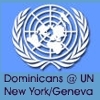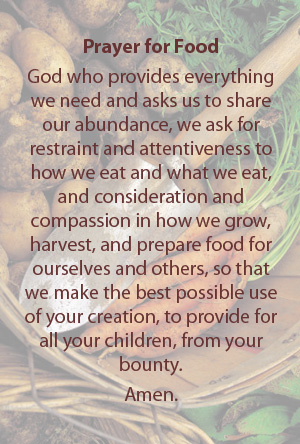

| BRIEFING - February 27, 2013 | To learn more about the Millenium Development Goals, click on the graphic New! Read the winter issue of the Dominicans at the UN newsletter Past Briefings: February 13, 2013 January 30, 2013 December 19, 2012 December 5, 2012 November 16, 2012 October 17, 2012 September 26, 2012 September 12, 2012 August 29, 2012 July 11, 2012 May 30, 2012 May 16, 2012 April 18, 2012 April 4, 2012 March 7, 2012 |
||
Food and faith: ‘Eating is a moral act’ By Kati Garrison, Dominican Volunteer The NGO Working Group on Food and Hunger represents one of the many committees at the United Nations in which the Dominican Leadership Conference actively participates. As with any working group, it remains essential for the DLC to keep informed in terms of current events and issues as they pertain to the corresponding subject matter. Consequently, this past weekend, I traveled to Ecumenical Advocacy Days (EAD) in Washington, DC, to pursue the acquisition of further knowledge surrounding prevalent concerns regarding food and hunger as well as strategies for advocacy. Quite fittingly, this year, “At God’s Table: Food Justice for a Healthy World” served as the theme of the EAD. I attended meetings covering topics ranging from genetically engineered crops and climate justice to the connection between food and conflict, and throughout each of these workshops and plenary sessions, the message that “eating is a moral act” repeatedly emerged. As articulated by Jim Ennis, the executive director of the National Catholic Rural Life Conference, (drawing upon the Catechism of the Catholic Church), “Eating is a moral act because it is a human act, and human acts can be morally evaluated.” Therefore, as Catholics, we need to ask the vital questions:
Furthermore, in 2003 the U.S. Conference of Catholic Bishops composed a letter to challenge us to increase our awareness about food and its relation to Church doctrine. This document (“For I was Hungry and You Gave Me Food; Catholic Reflections on Food, Farmers, and Farmworkers”) comments upon the inextricable link between food and agriculture the need to examine our interaction with matters pertaining to food and agriculture. However, I remain acutely cognizant of the fact that when beginning to pick apart our food habits, one can very quickly become overwhelmed due to the tremendous number of factors to take into consideration. Just a few of these aspects include:
Quite rapidly, the task of eating morally and advocating for food justice transforms into a truly daunting challenge. Thankfully, one particular meeting at the EAD provided me with the inspiration and hope to continue to aspire to achieve a more just food system that will empower individuals to eat morally. A workshop entitled “An Ecology of Liberation” featured guest speakers from successful sustainable food systems in Haiti and northern Nicaragua (Peasant Movement of Gros Morne and FEDICAMP). They described grassroots movements to overcome massive obstacles of deforestation, land grabbing, climate change, and food insecurity. Both success stories have established communities that grow their own food (in a sustainable fashion without the use of chemical fertilizers or pesticides), save their own seed, raise their own livestock, conserve the biodiversity of their own lands, and conduct their own educational courses on topics ranging from crop cultivation to family nutrition and eco-friendly cooking techniques. For me, these inspirational examples served as a reminder of the types of grassroots movements that need to have a voice at the United Nations. Even though the UN emphasizes the imperative to support grassroots initiatives, too often the political voices in the room are louder than those which will be more directly impacted by the implementation of its resolutions. Both of these communities (Gros Morne and FEDICAMP) serve as exemplars that the United Nations, and its partner entities, should strive to support while simultaneously empowering other citizens of the world to emulate and adapt to their own regions and contexts. In other words, individuals across the globe should be able to learn from these triumphs and endeavor to transform our food systems into morally just operations. This is the type of world that the DLC will continue to advocate to create. For more information on UN policies and initiatives regarding food security, visit the Committee on World Food Security (CFS) web site For more information on the Catholic perspective on ethical eating and what you can do to practice mindful eating in your life, read “Ethics of Eating” (National Catholic Rural Life Conference)
|
Dominican Leadership Conference
Building relationships and collaborating in the mission of preaching the Gospel
29000 West Eleven Mile Road
Farmington Hills MI 48336
248-536-3234 Contact: Executive Director


